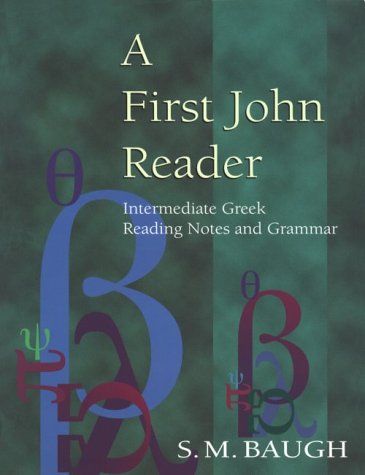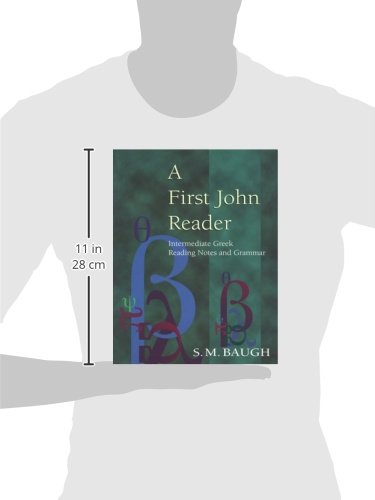


First John Reader: Intermediate Greek Reading Notes and Grammar
E**R
Baugh's First John Reader
Baugh's reader is about 150 pages in length. It is a unique work that I think will be of value to anyone who wishes to learn Greek in a fun and orderly manner.What makes Baugh's work unique is how he teaches Greek to the neophyte. By the time that the beginning Greek student has progressed through Baugh's book, he or she will have acquired a solid foundation in the Greek language and will also have worked his or her way through the entire book of 1 John. That is no little accomplishment for the beginning Greek student.In my humble opinion, Baugh's method is much more effective than simplylearning paradigms and morphological forms by rote memorization. His approach provides a methodological way to learn Greek that is simultaneously educative andstimulating. Baugh also sets forth penetrating exegetical questions as the studentworks his or her way through the reader, thus prompting the beginner tocontinue in the hopes of finding grammatical or exegetical treasure.Some ExamplesEach section of Baugh's reader deals with some particular grammatical issue(the Greek article, pronouns, cases, and tenses). Instead of just discussingthese matters abstractly, however, Baugh provides numerous examples from thebook of 1 John. On p. 3, Baugh points out that hO is "repeated four times in[1 John 1:1] at the beginning of the first four clauses (and once in v. 3)."But why does John keep employing hO in this passage? Baugh answers thisquestion in his reader and gives supplementary information buttressing hisstand vis-a'-vis the Johannine use of hO.On p. 50, Baugh also has a very insightful discussion about Greek aspect andits relationship to 1 John 3:9. He concludes that the standard interpretation of3:9 is probably the best one. When exegeting the passage, Baugh skillfullyinteracts with the views of D. Wallace and S. Smalley who do not espouse thehabitual sin view of 1 John 3:9 which Baugh advocates. This interaction isappreciated, because it helps the student to make up his or her own mindabout 1 John 3:9 and Greek aspect.The same cannot be said for other parts of Baugh's grammar. Overall I like his reader and do not regret that I purchased it. Nevertheless, there are some places where I have "quibbles" with his presentation.When discussing 1 John 3:2, Baugh talks about the dative of respect (hOMOIOIAUTWi), but never says to whom the dative of respect might apply. Does it possibly apply to the Father or to the Son? Granted, he writes concerning 1 John 3:1b that "the quality of God's love is John's focus.". But the author does not say whom Christians will be like, when commenting on 1 John 3:2c. Also, when speaking about 1 John 5:20, Baugh asks--"Who is the antecedent of hOUTOS? Jesus, the Son of God? Is this not an unambiguous statement of his deity?" Personally I think this section would have been better if Baugh asked the question and left it at that or offered grammatical possibilities. The student must decide who the antecedent of hOUTOS is, not the teacher. The instructor can guide, help, and point out little details here and there, but instruction is much more effective when a professor sets forth possibilities before students and lets them make grammatical decisions.I am not just taking Baugh to task because I disagree with him theologically at a number of different points. Rather, I just feel that his reader could have been more effective had he not pushed certain viewpoints at particular junctures in his work. Since I thrive intellectually from examining conflicting views and arriving at a conclusion that I believe is theologically and grammatically warranted, I can read Baugh's book and derive great benefit from it in spite of my "quibbles." In the final analysis, I give it 4 stars and would recommend this reader to those who are interested in learning ancient Greek. Baugh's work is valuable in its own way.Edgar G. Foster Christology and the Trinity: An Exploration (Volume 1)
N**N
Very Helpful Bridge
Baugh's "A First John Reader" is a very helpful book for anyone who has had a little bit of Koine Greek and is beginning to make the transition from learning forms and paradigms to more serious syntactical work. In this book, Baugh gives a running commentary, mainly focused on the Greek syntax, of the Greek text of 1st John.Each section of the book focuses on a particular grammatical concept (but in his comments he makes overlapping points throughout the chapters). For instance, the first chapter deals with the article and introduces the reader to several ways that the Greek article functions, grammatically, that are different from the oft appropriate translation, the English definite article ('the')--the Greek article may be simply continuing on the flow of thought, referring back to a previous word/idea, or several other uses. The aim of each section is to help the student better come to terms with the variety of ways that the Greek grammar functions, hopefully breaking them out of thinking about Greek grammar like English. Baugh has similar sections in the book devoted to verbs, infinitives, and other grammatical points.Also included in each section are vocabulary words--both the words which you must know in order to read the particular chunk of 1 John, and also other Greek words in order of descending frequency of usage. As an aid to reading the text Baugh also parses the more difficult verbs and forms in 1 John, though, as should be expected, as you work through the book he provides less and less help.Corresponding to the grammatical points of each section in the book, Baugh includes a basic grammar at the end. In it he discusses the main uses of the article, the adjective, the cases, the infinitive, the participle, etc. This is a useful, miniaturized grammar, that can serve as a less painful way of learning how to utilize more advanced grammatical tools, such as Wallace or BDF, which include vast arrays of information and cover many more grammatical points.The one weakness of this book is it lack of treatment on participles. This is largely due to the fact that the Greek of 1 John, which is quite easy Greek, basically only has adjectival (and really only substantival--noun-like) participles. Baugh does discuss the major uses of participles in his condensed grammar in the end, but, unlike the other concepts, there is very little in his grammatical interaction with the text that deals with participles. This is unfortunate, since participles. along with infinitives, are certainly among the most difficult concepts in Greek for the English learner to get the hang of.Overall, this is a valuable book. Baugh provides a service to the intermediate learner of Greek by both teaching more of the diversity of Greek grammar, but also through demonstrating how knowledge of the grammar should inform the way that the learner reads the Greek text. I highly recommend this book as a bridge between an introductory grammar and a more advanced grammar. It will aid the reader in their ability to utilize grammatical tools, to analyze the grammar of a text, and to read Koine which, in the end, is the real purpose for trying to learn the language in the first place.
H**S
An Excellent Koine Resource
I just finished this workbook and found it to be one of the most helpful resources I've used for learning NT Greek. I highly recommend it. The author challenges you to think through each verse, and gives you the tools (and sometimes hints) to do just that. After a 10 year hiatus from studying NT Greek, this book helped me gain some skills and confidence in reading the text on my own.
L**R
... not managed to get into it yet and vey pleased with the product
Still have not managed to get into it yet and vey pleased with the product.
J**S
Five Stars
Used this in my Greek class and found it very helpful!
J**Y
Very good book. But I caution that you need to ...
Very good book. But I caution that you need to have at least a year of basic Greek under your belt. Basic knowledge needs to be solid.
J**O
Yes, you will read 1 John in Greek!!!
A very user-friendly book that will take you through the Greek text of 1 John. The second-year vocabulary in this Grammar along with any typical first-year Greek primer will enable you to read upwards of 90% of the New Testament.
D**R
Five Stars
A very good first John reader.
T**8
文法事項の解説が詳しい聖書ギリシア語読解ガイド
聖書ギリシア語の初級文法を終えた人がヨハネ第1の手紙を題材に読解能力を養うためのワークブックです。ボキャブラリー欄には各章に出てくる単語がすべて英訳付きで載っているので、とりあえず辞書なしでも読み進められます。また、巻末には希英語彙集と本文に出てくるすべての動詞の変化表がついているのも便利です。願わくば、ヨハネ第1の手紙のギリシア語本文も掲載してほしかった。ギリシア語本文についてはGreek New Testamentなどを持っている必要があります。内容的には、文法的解説が非常に詳しいのが特徴です。一応本文では著者自身の書いた文法書の該当箇所が指定されていますが、Machen, Wenham, Mounceの著名な聖書ギリシア語文法書とのクロス・レファレンスがあるので、これらのうちどれかを持っていれば十分です。
Trustpilot
1 week ago
2 days ago